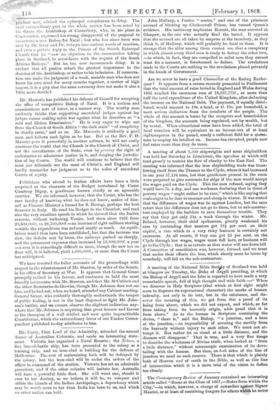A meeting of about 1,500 shipwrights and some shipbuilders was
held last Saturday in Limehouse, the speeches at which will tend-greatly to restrict the flow of charity to the East End. The meeting was informed that the iron shipbuilding trade was trans- ferring itself from the Thames to the Clyde, where it had increased in one year 37,124 tons, but that gentlemen present in the room were prepared to give contracts for ships if the men would accept the wages paid on the Clyde. This the men refused, saying they would have 7s. a day, and one workman declaring that in times of poverty wages " ought rather to be rose," which is like saying that coals ought to be dear in summer and cheap in winter. It was stated that the difference of wages was 2s. against London, but the men retort that the difference does not go to them, but to sub-contrac- tors employed by the builders to save themselves trouble. They say that they get only 34s. a week through the winter. Mr. Roland, however, their chief spokesman, greatly weakened his case by contending that masters got 19f per cent. on their capital, a rate which in a very risky business is certainly not enormous. At all events, if they can get 25 per cent. on the Clyde through low wages, wages must fall here, or business will go to the Clyde ; that is as certain as that water will run down hill A Committee of conciliation was, however, formed, and we trust that under their efforts the loss, which clearly must be borne by somebody, will fall on the sub-contractors.


































 Previous page
Previous page